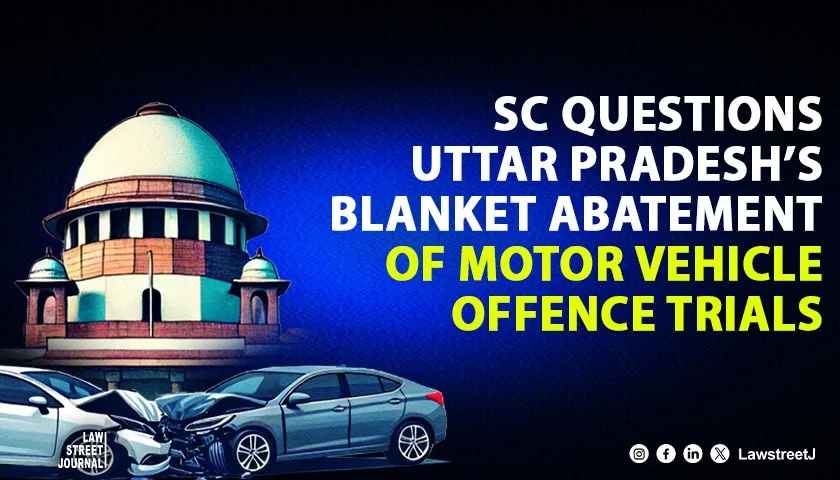New Delhi: The Supreme Court of India has expressed serious concerns over Uttar Pradesh’s legislation that automatically abated thousands of pending criminal trials for offences under the Motor Vehicles Act, particularly questioning how non-compoundable offences such as drunken driving could be summarily terminated.
A bench comprising Justice J.B. Pardiwala and Justice K.V. Viswanathan, hearing the long-running road safety matter, made critical observations on the implications of the Uttar Pradesh Criminal Law (Composition of Offences and Abatement of Trials) (Amendment) Act, 2023.
The court was hearing Writ Petition (Civil) No. 295/2012 filed by S. Rajaseekaran against the Union of India, with Mr. Gaurav Agrawal serving as Amicus Curiae. The bench was examining multiple interim applications concerning road safety measures and enforcement of provisions under the Motor Vehicles Act.
Noting the concerning history of such legislation in Uttar Pradesh, the court observed that this practice had been recurring for over 44 years, remarking that “this practice spanning an uninterrupted period from before 01.01.1977 to 31.12.2021 (a span of 44 years) be deemed arbitrary, unjust, and unreasonable.”
Addressing the immediate impact of the 2023 Amendment Act, the court stated:
“What we have been able to gather in the course of today’s hearing is that the effect of the abatement of trials for the offences punishable under the Motor Vehicles Act as of 31.12.2021 is going to be drastic. All criminal proceedings pending before the Magistrates for offences under the Motor Vehicles Act stood automatically terminated.”
The court expressed particular concern about non-compoundable offences being abated. Highlighting Section 185 as a prime example, the bench observed:
“Section 185 makes driving by a drunken person or by a person under the influence of drugs an offence. It is a non-compoundable offence. If it is a non-compoundable offence, we wonder how the State could bring an amendment and, in one go, inform the concerned court that the proceedings have stood abated.”
The bench emphasized the consequences of such abatement, stating:
“This means that the person who was booked for the offence of driving in a drunken condition or under intoxication goes scot-free. It is possible that such a case may have been pending for the past five years, but should that by itself justify abatement of the proceedings?”
Responding to the State’s justification, the court noted the argument that in cases where a drunken driver caused injury or death, prosecution under the IPC would still continue. However, the court rejected this reasoning, stating:
“The aforesaid illustration is hardly a justification to support such Amendment Act. It would be too much to say that Section 185 proceedings would be dropped and the concerned person would be prosecuted under Section 279 or Section 304A of the IPC, as the case may be.”
Emphasizing the importance of deterrence in traffic regulation, the court observed:
“Abatement of proceedings in one shot would take away the sting of deterrence insofar as such offences are concerned. In a country like India, traffic is a big problem. Regulation of traffic is a big challenge in major cities and even in towns. Citizens are not so disciplined insofar as abiding by traffic rules and regulations is concerned.”
Highlighting the need for enforcement mechanisms, the bench noted:
“In such circumstances, there has to be some deterrence so that a check remains on people indulging in offences relating to the Motor Vehicles Act, more particularly the youngsters. The consequences, in this regard, would be extremely grave. This is an age of highly powerful cars, and it is a matter of common experience how accidents are caused because drivers are unable to control these powerful cars.”
The court directed the State of Uttar Pradesh to justify the amendment, stating:
“We want the Secretary of the Legal Department, State of Uttar Pradesh, as well as the Secretary of the Transport Department of the State of Uttar Pradesh, to file an affidavit justifying section-wise abatement of the proceedings.”
Cautioning the State, the court remarked:
“If we may not sound very harsh, this Amendment Act should not be in the form of a step to eradicate the arrears of pending cases in different courts of the State of U.P.”
The court also highlighted concerning statistics, noting that “the dismal disposal rate of 0.96 crore challans out of 3.57 crore issued further reflects inefficiency in enforcing traffic laws. This laxity has notably positioned Uttar Pradesh as the leading state in road fatalities for the years 2018, 2019, 2020, 2021, and 2022.”
Additionally, the court referred other matters to the Justice A.M. Sapre Committee, directing it to examine issues related to cashless treatment for road accident victims and submit its report within six weeks.
Case Title: S. Rajaseekaran vs. Union of India & Ors.
Case Number: Writ Petition (Civil) No. 295/2012













